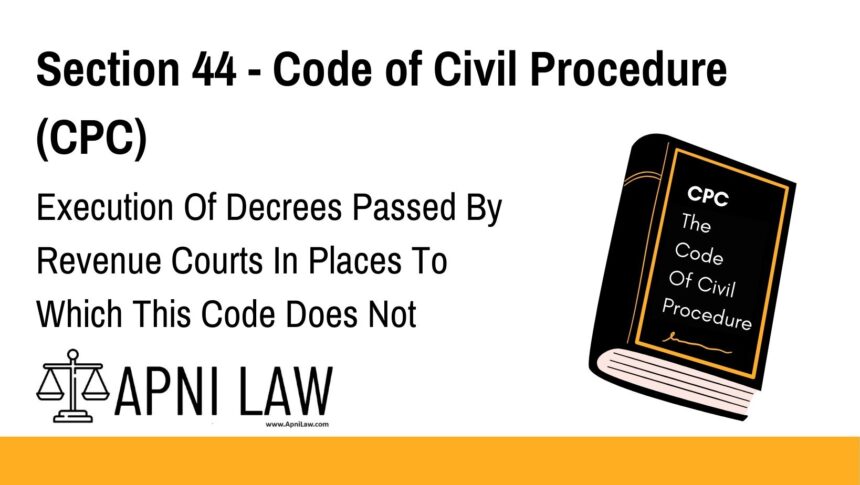Code
CPC1[44]. Execution of decrees passed by Revenue Courts in places to which this Code does not
extend.– The State Government may, by notification in the Official Gazette, declare that the decrees of
any Revenue Court in any part of India to which the provisions of this Code do not extend, or any class of
such decrees, may be executed in the State as if they had been passed by Courts in that State.]
Perfect 👍 Now let’s prepare the SEO-friendly structured article for Section 44 CPC – Execution of Decrees Passed by Revenue Courts in Places Where CPC Does Not Extend in the ApniLaw style.
Section 44 CPC: Execution of Decrees Passed by Revenue Courts in Places Where CPC Does Not Extend
Code
Section 44 – Code of Civil Procedure, 1908
The State Government may, by notification in the Official Gazette, declare that the decrees of any Revenue Court in any part of India to which the provisions of this Code do not extend, or any class of such decrees, may be executed in the State as if they had been passed by Courts in that State.
📖 Source: Section 44 CPC – Execution of Decrees Passed by Revenue Courts (ApniLaw)
Explanation
Section 44 CPC deals with the execution of decrees passed by Revenue Courts in territories where the Code of Civil Procedure does not apply.
- The State Government has the power to issue a notification in the Official Gazette.
- Such a notification authorizes the decrees (or a class of decrees) passed by Revenue Courts in non-CPC territories to be executed within that State.
- Once notified, these decrees are treated as if they had been passed by the Civil Courts of that State.
This ensures that Revenue Court decrees from outside CPC jurisdiction are not rendered ineffective and can still be executed in CPC territories.
Illustrations
- Example 1:
A Revenue Court in a non-CPC area passes a decree for recovery of land revenue. If the State Government notifies it under Section 44 CPC, the decree can be executed in Rajasthan as if a Rajasthan Civil Court had passed it. - Example 2:
The State Government issues a notification allowing all tenancy-related decrees from a Revenue Court in a scheduled area to be executed in the State.
Common Questions and Answers
1. What is the purpose of Section 44 CPC?
It empowers State Governments to recognize and enforce Revenue Court decrees from areas outside CPC’s jurisdiction.
2. How does Section 44 CPC differ from Section 43 CPC?
- Section 43 CPC: Applies to Civil Courts in non-CPC territories or Courts outside India (under Central Govt).
- Section 44 CPC: Applies to Revenue Courts in non-CPC territories.
3. Who has the authority under Section 44 CPC?
The State Government, through a notification in the Official Gazette.
4. Can all Revenue Court decrees be executed under Section 44 CPC?
Not automatically. Only those decrees (or classes of decrees) that are specifically notified by the State Government can be executed.
Conclusion
Section 44 CPC provides a mechanism for execution of decrees from Revenue Courts in non-CPC territories by empowering State Governments to recognize them through notifications.
It ensures that such decrees are not rendered ineffective and are enforceable as if they were passed by Civil Courts in the State.
👉 Read more: Section 44 CPC – Execution of Decrees Passed by Revenue Courts (ApniLaw)








